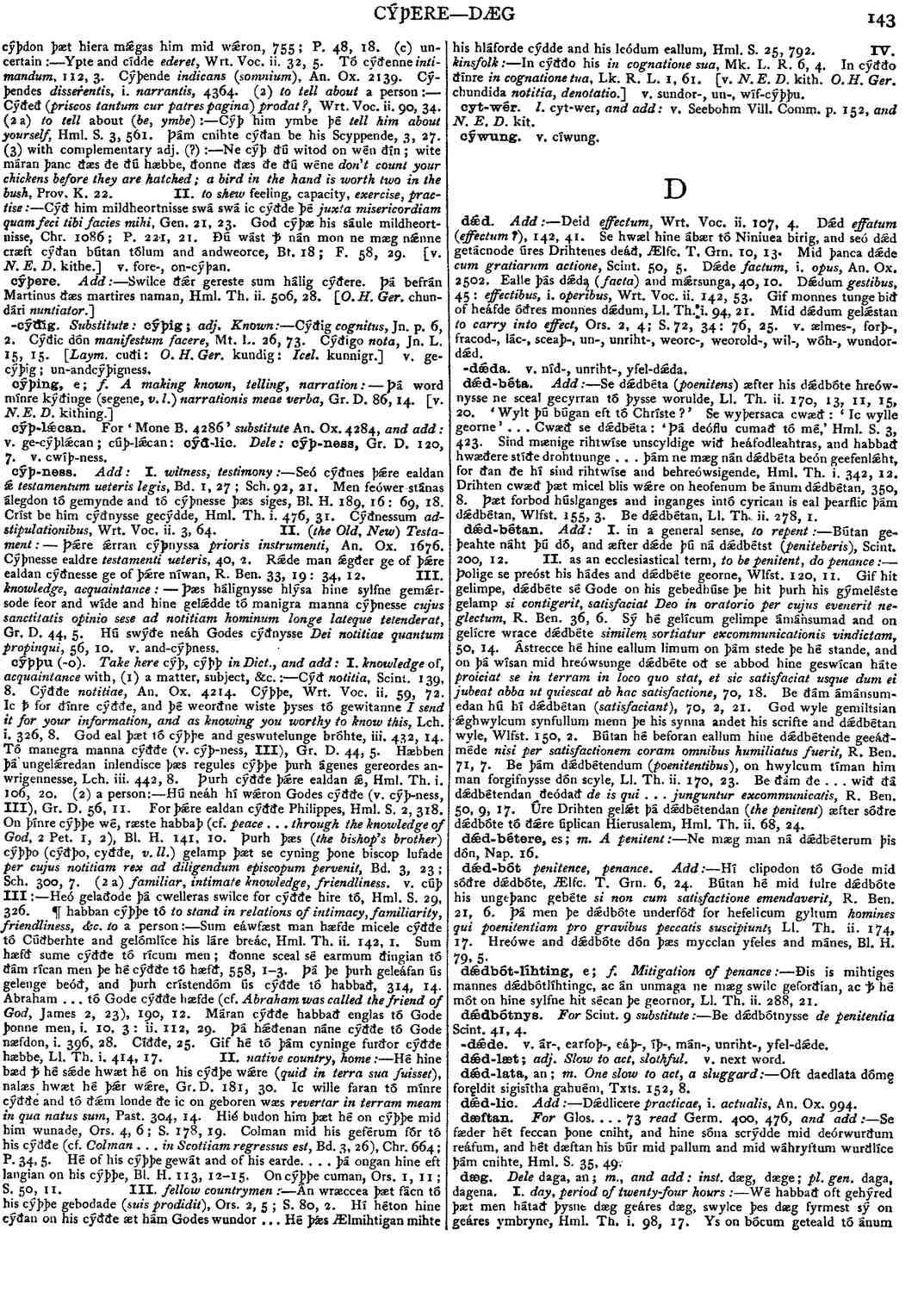dæg
- noun [ masculine ]
-
Wé habbað oft gehýred þæt men hátað þysne dæg geáres dæg, swylce þes dæg fyrmest sý on geáres ymbryne,
- Hml. Th. i. 98, 17.
-
Ys on bócum geteald tó ánumdæge fram þǽre sunnan úpgange oð ꝥ heó eft becume þǽr heó ǽr úp stáh on þám fæce synd getealde feówer and twénti tída,
- Lch. iii. 236, 3.
-
On þám forman dæge dagena ealra,
- Hy. S. 4, 2.
-
Dæge ǽr
pridie,
- Wrt. Voc. ii. 68, 50.
-
Ðá cóm se arceb̃ fram Róme áne dæge ǽr Sc̃s Petrus mæsseǽfene,
- Chr. 1048; P. 172, 3.
-
Fram dæge tó dæge,
- Wlfst. 79, 12: Hml. S. 23, 33.
-
Ðá ðe ǽlce dæg symblað,
- Past. 309, 8: Ors. 2, 6; S. 88, 11.
-
Farað six dagas simble ymbe þá burh ǽlce dæg ǽne (
semel per diem
),- Jos. 6, 3, 12: Lch. ii. 108, 6: Bt. 26, 2; F. 92, 14.
-
Hé ǽlce dæge symblede,
- Past. 309, 5.
-
Hé sǽde þæt hé þone dæg forlure þe hé nóht tó góde on ne gedyde,
- Chr. 81; P. 8, 7.
-
Þrý dagas wǽron ǽr þám dæge bútan sunnan and mónan,
- Lch. iii. 238, 19.
- ii. mónðas and .xxi. daga,
- Chr. 643; P. 27, 34.
-
Mǽstra daga ǽlce,
- 894; P. 84, 29.
-
Seofon dagena fæsten, Hml. Th. i. 434, 21. I a.
day (as in one day), time
of an occurrence :-- Ánes dæges þe abbot eóde into capitulan,- Chr. 1083; P. 214, 22.
-
Þá sume dæge rád se cyng be þǽre eǽ,
- 896; P. 89, 11.
-
Hyt wæs þá on dæg restedæg
it was the sabbath at that time,
- Nic. 7, 5.
-
Hyt wæs on dæg þá gé mé beclýsdon
it was at the time when you shut me up,
- 10, 35: Chr. 1083; P. 215, 7.
-
Oþ þisne andweardan dæg up to the present time, 851; P. 64, 23. (See also tó dæge, dæg under tó.) In dægum hungres
in diebus famis,
- Ps. Srt. 36, 19.
-
Ðá hwíle ðe se rodor ǽne betyrnð gǽð forð feówor and twéntig tída, ðæt is ealles án dæg and án niht,
- Hex. 8, 32.
-
Áþiéstrode sió sunne áne tíd dæges, Chr. 879; P. 76, 25. Matutinum úhttíd
sive
beforan dæge,- Wrt. Voc. ii. 58, 64.
-
Geé*-*fenedan deige
advesperescente die,
- Kent. Gl. 186.
-
Ðonne hit neálǽcð dæge, ðonne singð se cocc smælor,
- Past. 461, 3.
-
Ꝥ Sc̃s Petrus on dæge folce sǽde, þonne wrát Sc̃s Marcus ꝥ on niht,
- Shrn. 74, 19.
-
Gé hwyrfað niht tó dæge,
- Wlfst. 47, 8.
-
Eall swá þicce is þeó heofon mid steorrum áfylled on dæg swá on niht . . . Wé hátað ǽnne dæg fram sunnan úp*-*gange oð ǽfen,
- Lch. iii. 234, 31-236, 2.
-
Ðæt hió hæbbe ðæt land hire dæg . . . and efter hire dæge geselle hit . . . ðám hírode,
- C. D. ii. 58, 22.
-
Tó syllanne on dæge and æfter dæge (in his lifetime and after it) þám þe him leófust sý, iv. 117, 20. ¶
in pl. days
of life :-- Swegen geendode his dagas,- Chr. 1014; P. 144, 27.
-
Ic wearð ásend on Æþelrédes dæge cyninges tó sumum mynstre,
- Hml. Th. i. 2, 14.
-
Féng Æþelbryht tó þám ríce . . . on his dæge cuóm micel sciphere,
- Chr. 860; P. 68, 2.
-
Mauricius and Valentines onféngon ríce, and rícsodon .vii. winter; and on hiera dagum Hengest and Horsa gesóhton Bretene,
- 449; P. 12, 5.
-
On þrióra consula dæge cóm Hasterbal,
- Ors. S. 4, 10.
-
On þára twégea consula dæge, 3, 6; S. 108, 22. ¶
in pl. days of a reign :-- On his (Beorhtric )
dagum cuómon ǽrest .iii. scipu,- Chr. 787; P. 54, 4.
- Hé geseah þá ceastre and cwæð: 'Eálá, gif þú wistest on þysum þínum dæge,' Lk. 19, 42. v. ár, bæd-, bebod-, bén-, ceáp-, cípe-, clǽn*-*sung-, eáster-, eáster-freóls-, foran-, fugol-, gearwung-, gefyrn-, gereord-, hádung-, heáhfreóls-, heáhmæsse-, offrung-, palm-, reste-, resten[d]-, swǽsend-, sweotolung-, swíg-, teóþung-, þeorf-, weorþung-, wól-, ymbren*-*dæg; dæges.
Bosworth, Joseph. “dæg.” In An Anglo-Saxon Dictionary Online, edited by Thomas Northcote Toller, Christ Sean, and Ondřej Tichy. Prague: Faculty of Arts, Charles University, 2014. https://bosworthtoller.com/42529.
Checked: 0